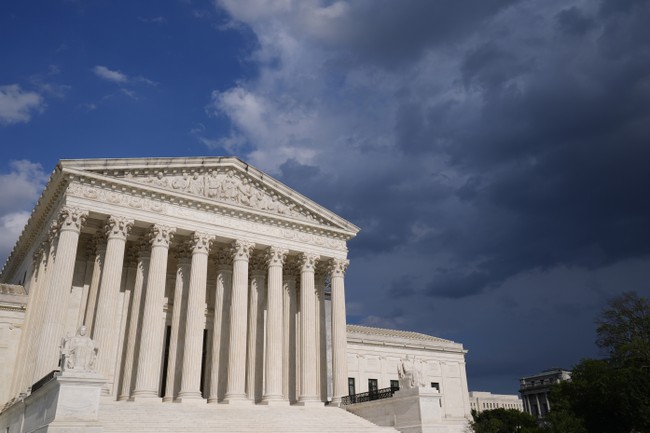The Supreme Court heard oral arguments today in a case arising out of Montgomery County, Maryland. The case was brought by a group of religious parents who asked lower courts for the right to opt their kids out of the reading of certain LGBT-themed books which were being read in classrooms with children as young as 5-years-old.
The parents argue that Montgomery County schools had long allowed parents to opt their kids out of instruction involving sex and family life but claim that changed after there was a backlash to the adoption of the LGBT books in 2022.
…in 2022, the Board introduced a series of controversial “LGBTQ-inclusive” storybooks to be read and discussed with students in pre-K through fifth grade. When hundreds of parents raised religious objections, the Board for the first time eliminated notice and opt-outs—directing administrators and teachers that parents could no longer be notified when the books were taught or be allowed to opt their children out. The Board’s own documents reveal that its goal in compelling children to participate in this instruction is to “disrupt” their “either/or thinking” on gender and sexuality. And the Board concedes that children may “come away from [such] instruction with a new perspective not easily contravened by their parents.”
The push behind the introduction of the books appears to be based on DEI, specifically equity with regard to sexual orientation.
In 2019, Maryland enacted regulations seeking to promote “educational equity,” which it defined as “view[ing] each student’s” “gender identity and expression,” “sexual orientation,” and other specified “individual characteristics as valuable.”…In deciding which books to adopt into its curriculum, the Board said it would review options through an “LGBTQ+ Lens” and ask whether books “reinforced or disrupted” “stereotypes,” “cisnormativity,” and “power hierarchies.”
And since the issue at hand here is the books and messages I’m quoting the plaintiffs description of the books at length. I’ve cleaned up some of the citations to make it easier to read.
One of the selected books, Pride Puppy, is a picture book directed at three- and four-year-olds. It describes a Pride parade and what a child might find there. The book invites students barely old enough to tie their own shoes to search for images of “underwear,” “leather,” “lip ring,” “[drag] king” and “[drag] queen,” and “Marsha P. Johnson,” a controversial LGBTQ activist and sex worker.
My Rainbow, a picture book for all elementary ages, tells the story of an autistic boy who identifies as a transgender girl. When his mother points to her own short hair, he responds: “People don’t care if cisgender girls like you have short hair. But it’s different for transgender girls. I need long hair!” The mother decides that her child knows best and sews him a rainbow-colored wig.
Intersection Allies is a picture book intended for “Kindergarten through Grade 5.” It invites children to ponder what it means to be “transgender” or “non-binary” and asks “[w]hat pronouns fit you?” By “standing together,” the book claims, we will “rewrite the norms.”
In another book, What Are Your Words?, an uncle visits “their” niece/nephew, whose pronouns are “like the weather. They change depending on how I feel.” The child spends the day agonizing over the right pronouns. Only at the end of the day, while watching fireworks, does the child finally conclude that “I’m like fireworks! * * * My words finally found me! They and them feel warm and snug to me.” At least for “today.”
Another—Love, Violet—also for “Kindergarten through Grade 5,” is about two young girls and their same-sex playground romance. One of the girls “blush[es] hot” when pressed about her “SPECIAL” valentine. Teachers are encouraged to have a “think aloud” moment to ask students how it feels when they “don’t just ‘like’” but “like like” someone.
Born Ready, for all elementary ages, tells the story of a biological girl named Penelope who identifies as a boy. When Penelope’s brother questions how someone can “become” a boy, his mother chides him that “[n]ot everything needs to make sense. This is about love.” Teachers are told to instruct students that, at birth, doctors “guess about our gender,” but “[w]e know ourselves best.”
Finally, Jacob’s Room to Choose is about two young children who identify as transgender. Their teacher uses a game to persuade their classmates to support gender-free bathrooms. After relabeling the bathroom doors to welcome multiple genders, the children parade with placards that proclaim “Bathrooms Are For Every Bunny” and “[choose] the bathroom that is comfy.”
There are some caveats here. First, there is disagreement in the record over which books were being used by the school. The school district claims there are only five controversial books in use and only three of those overlap with the list above. Specifically the school district says, Uncle Bobby’s Wedding; Intersection Allies; Prince & Knight; Love, Violet; and Born Ready were all added to the curriculum. It says that Pride Puppy and My Rainbow were also added to the curriculum but later removed.
Along with the books, teachers were also given written guidance:
They are directed to explain that “people of any gender can like whoever they like” and to interrogate students over whether they “think it’s fair for people to decide for us who we can and can’t like?” Teachers are encouraged to follow-up with an “example,” like “My best friend is a woman and she is married to another woman.” If students say it’s “weird” for a girl to claim being “a boy if he was born a girl,” the teacher is to emphasize that “not everyone is a boy or girl” and that “[s]ome people identify with both, sometimes one more than the other and sometimes neither,” so students “shouldn’t” “guess” but instead solicit others’ “pronouns.” When it comes to “what their gender is,” teachers are to tell students that “they are the experts on themselves” and that “[s]ometimes people feel like a boy or a girl, sometimes they feel like both, sometimes they feel like neither.” Teachers are told to frame disagreement with these ideas as “hurtful,” and to counter with examples of “[m]en who paint their nails” or “wear[] dresses.”
The guidance documents also instruct teachers— twice—to “[d]isrupt the either/or thinking” of elementary students about biological sex.
So that’s what religious parents in Montgomery County have been objecting to, the introduction of the books but also the guidance which indicates all of this thinking is intended to be taught to young kids regardless of what the parents believe about these topics.
Importantly, the parents have not asked for the books to be removed from the classroom or from the library, only that their kids be allowed to opt out. If you look around at the claims being made about this case, some on the left are claiming this is about banning books but that’s not the case.
In their brief in the Supreme Court, the parents point to two different Supreme Court cases. First, they say, more than 50 years ago in Wisconsin v. Yoder, the justices “recognized ‘beyond debate’ the First Amendment right of parents ‘to guide the religious future and education of their children.’” This means, they say, that under the free exercise clause, parents can opt out of instruction that would “substantially interfere with their religious development.”
In Yoder, the parents observe, the court held that Amish parents did not have to send their children to school after the eighth grade, because they believed that doing so conflicted with their religion and way of life. Here, the parents say, they are merely seeking to be able to excuse their young children from one particular subset of the public schools’ instruction that “deliberately seeks to confound their religious values.”
And under the Supreme Court’s 1993 decision in Church of Lukumi Babalu Aye v. City of Hialeah, the parents continue, the school board’s policy is unconstitutional because it is neither neutral nor generally applicable. The board of education, the parents stress, has “long allowed notice and opt-outs for any ‘instruction related to family life and human sexuality.’” But by contrast, the parents write, they cannot opt to have their very young children sit out discussions on “sexuality and gender identity during English class.” Moreover, they add, board members have displayed “explicit religious hostility” to the parents who have objected to the curriculum, suggesting that they were aligned with “white supremacists” and “xenophobes.”
So oral arguments in Mahmoud v. Taylor took place today and Jonathan Turley was listening in. It sounds like Justice Sotomayor is leading the charge for the left.
…Eric S. Baxter (representing the parents) is getting close questioning from Justice Sotomayor whether “the mere exposure” to these books is a real “burden.”…
— Jonathan Turley (@JonathanTurley) April 22, 2025
Justice Alito is pushing back on her characterizations of the books in question.
…There is a growing heat to the exchanges between the justices. Sotomayor just tried to disagree with Alito’s portrayal and Alito pushed back and asked to allow him to finish…
— Jonathan Turley (@JonathanTurley) April 22, 2025
…Justice Sotomayor is hammering Baxter and citing to parent objections to material on various grounds as a type of slippery slope objection…
— Jonathan Turley (@JonathanTurley) April 22, 2025
…Justice Alito is noting that this case involves extremely young children as young as five. He notes that as children become older, they are more able to “make distinctions” about what a teacher is presenting and what may not be their own views…
— Jonathan Turley (@JonathanTurley) April 22, 2025
…Justice Sotomayor is disagreeing with counsel about the meaning of one of the books. Sotomayor’s questioning is especially active and argumentative with the parent’s counsel…
— Jonathan Turley (@JonathanTurley) April 22, 2025
…Baxter responded that the objections must be religious and sincere to demand such an opt outs. Kagan insists “she is really searching for something” to base a rule on…
— Jonathan Turley (@JonathanTurley) April 22, 2025
…Justice Kavanaugh made an important push back on Sotomayor that the operative work is not “coercion” but “burden.” He also noted that the parents are not trying to bar the use of the books but only their right to have their children opt out…
— Jonathan Turley (@JonathanTurley) April 22, 2025
…Justice Kavanaugh said that “as a longtime resident of Montgomery” he was “mystified how it came to this.” Interestingly, Baxter also said that his kids graduated from the same district…
— Jonathan Turley (@JonathanTurley) April 22, 2025
…I have to run to meet with students and faculty at Colgate University. However, Sarah M. Harris, Principal Deputy Solicitor General is finished and did a particularly compelling job in fending off rapid questions from Justice Jackson and others. Very impressive job.
— Jonathan Turley (@JonathanTurley) April 22, 2025
Boys can be girls and girls can be boys is not a message most parents want their 1st graders hearing but the left is using DEI and the school curriculum machinery to shoehorn these messages into classrooms for kids as young as five. Parents have had to go to the Supreme Court to try to get the right to opt their kids out. Hopefully, the court will side with the parents on this one. We’ll have to wait a few months to find out.
Read full article at source
Stay informed about this story by subscribing to our regular Newsletter


